

Alfred the Great: The Most Perfect Man in History? King Alfred of Wessex (r.871-99) is probably the best known of all Anglo-Saxon rulers, even if the first thing to come into many people’s minds in connection with him is something to do with burnt confectionery.
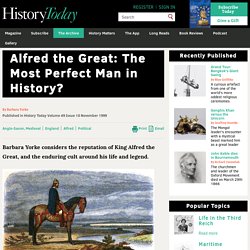
The year 1999 saw the 1100th anniversary of his death on October 26th, 899, at the age of about 50. The occasion is being marked with conferences and exhibitions in Winchester, Southampton and London, but the scale of celebrations will be modest compared with those which commemorated his millenary, and culminated in the unveiling by Lord Rosebery of his statue in Winchester.
Alfred’s reputation still stands high with historians, though few would now want to follow Edward Freeman in claiming him as ‘the most perfect character in history’ (The History of the Norman Conquest of England, 5 volumes, 1867-79). Alfred is someone who has had greatness thrust upon him. How and why did he acquire his glowing reputation, and how does it stand up today? The age of Alfred the Great 871 to 924. 871 AD to 899 AD and to Althelfleda and Edward the Elder to 924 AD.
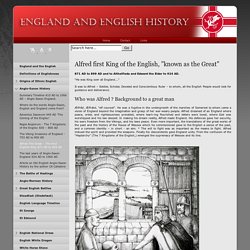
“He was King over all England….” It was to Alfred – Soldier, Scholar, Devoted and Conscientious Ruler – to whom, all the English People would look for guidance and deliverance. Who was Alfred ? Background to a great man Ælfrēd, Ælfrǣd, "elf counsel". Such an achievement – and its story is unfolded in this part and its chapters – is impressive, indeed unparalleled.
ANGLO-SAXON PROSE. In all language ,poetry made its appearance before prose ,and that was also true about Anglo-Saxon prose.Anglo-Saxon prose ,however ,fared much better than its counterpart -Anglo-Saxon poetry .In fact English literary prose came actually as late as nineteenth century under king Alfred's patronization.Anglo-Saxon poetry was archaic and a bit complicated ,but Anglo -Saxon prose was rather comparatively modern and simple.

About Anglo-Saxon prose ,two specific features must be noted at the very beginning .In the very first place it has an essentially has national appearance .In the second place ,it is much closer to modern English than Anglo-Saxon poetry. Aeifric and Wulfstan are the most prominent prose writer of Anglo-Saxon age .Catholic Homilies is famous book of Aeifric.There are a few prose works Blickling Homilies ,a group of nineteenth sermon ,contained in a manuscript ,And some other homilies and fragmentary prose works. Anglo Saxon. OUR FIRST SPEECH.
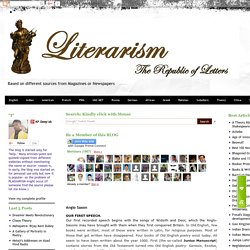
Our first recorded speech begins with the songs of Widsith and Deor, which the Anglo-Saxons may have brought with them when they first conquered Britain. In Old English, few books were written; most of those were written in Latin, for religious purposes. Most of those that got written have disappeared. Four books of Old English poetry exist today. All seem to have been written about the year 1000. At first glance these songs in their native dress look strange as a foreign tongue; but when we examine them carefully we find many words that have been familiar since childhood.
It is this old vigorous Anglo-Saxon language which forms the basis of our modern English. Anglo-Saxon literature - English and Related Literature, The University of York. Overview The poetry and prose of the Anglo-Saxons stands at the beginnings of English literature.
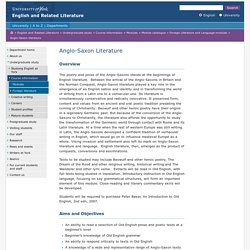
Between the arrival of the Anglo-Saxons in Britain and the Norman Conquest, Anglo-Saxon literature played a key role in the emergence of an English nation and identity and in transforming the world of writing from a Latin one to a vernacular one. Its literature is simultaneously conservative and radically innovative. It preserved form, content and values from an ancient and oral poetic tradition predating the coming of Christianity: Beowulf and other heroic poetry have their origins in a legendary Germanic past. Anglo-Saxon Culture. The Anglo-Saxons were Germanic barbarians who invaded Britain and took over large parts of the island in the centuries following the withdrawal of the Roman Empire.
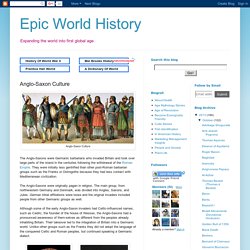
They were initially less gentrified than other post-Roman barbarian groups such as the Franks or Ostrogoths because they had less contact with Mediterranean civilization. The Anglo-Saxons were originally pagan in religion. The main group, from northwestern Germany and Denmark, was divided into Angles, Saxons, and Jutes. German tribal affiliations were loose and the original invaders included people from other Germanic groups as well. Anglo-Saxon. Anglo-Saxon, term used historically to describe any member of the Germanic peoples who, from the 5th century ce to the time of the Norman Conquest (1066), inhabited and ruled territories that are today part of England and Wales.
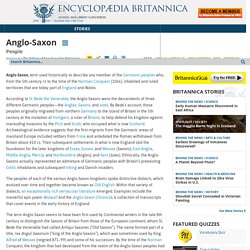
According to St. Exploring the Depth and Beauty of Anglo-Saxon Literature. This map shows kingdoms in the island of Great Britain at about the year 800 CE.
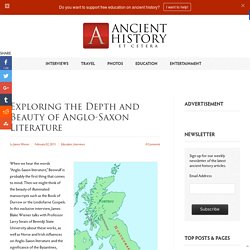
When we hear the words “Anglo-Saxon literature,” Beowulf is probably the first thing that comes to mind. Then we might think of the beauty of illuminated manuscripts such as the Book of Durrow or the Lindisfarne Gospels. In this exclusive interview, James Blake Wiener talks with Professor Larry Swain of Bemidji State University about these works, as well as Norse and Irish influences on Anglo-Saxon literature and the significance of the Byzantines, Theodore and Hadrian, who came to Northumbria in the seventh century CE. Professor Swain recommends learning Old English in order to be able to read works in Old English, of course, but equally intriguing, to allow us to better express ourselves in modern English. JW: Professor Swain, what do you find so compelling about the Anglo-Saxons and their literature? LS: That is a difficult question to answer.
At roughly the same time, I discovered J. Image Key: Dr. Anglo-Saxon literature - English and Related Literature, The University of York.